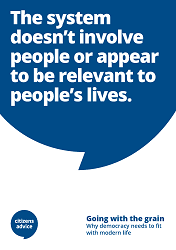Going with the grain: Why democracy needs to fit with modern life
 The word 'democracy’ conjures up many different images: from ballot boxes, to public marches; from the House of Commons, to online forums. Whatever form it takes, democracy is about citizens having influence over the decisions and services that affect their lives everyday, and having the access to tools and channels which enable this.
The word 'democracy’ conjures up many different images: from ballot boxes, to public marches; from the House of Commons, to online forums. Whatever form it takes, democracy is about citizens having influence over the decisions and services that affect their lives everyday, and having the access to tools and channels which enable this.
We might not think about this when things are working well, but we want to be able to help fix problems or have influence if we want a different outcome. At Citizens Advice, we see the challenges people face when things go wrong. We see how frustrated people can be when they are not able to fix something themselves, or get through on the phone, or get the information they need.
This is the frontline of democracy. Making democracy work is as much about improving the services, processes and tools to support everyday decision-making and influence, as it is about voting systems and constitutions.
Going with the grain: Why democracy needs to fit with modern life [ 3.3 mb] argues that to build stronger communities, change people’s attitudes towards politics, and improve participation, we need to improve the democratic services and processes that people interact with everyday. To do so, we need to understand how day-to-day pressures, challenges and behaviours are affecting people’s experience, how they want to engage, and how services and processes can be more responsive to people’s needs and go with the grain of modern life.
Policy Researcher Temi Ogunye's blog
Our research found that, while the British public are committed to contributing to society, democratic processes and services are out of sync to with people’s lives and values. The political system is failing to promote the values and characteristics of citizenship that the population upholds, and lack of influence stands out as a key area. The public think that democratic processes and channels for influence need to improve.
In particular, we found evidence of two ‘biases’ in the design of democratic processes.
-
First, the financial security bias. Only 26 per cent of the population report feeling confident about their financial security over the coming years, and those who are financially insecure are poorly served by democratic processes and channels for influence. This may be because those who do not feel financially secure lacked the headspace to engage with issues that don’t feel immediately relevant to their own lives, or do battle with overly complicated democratic processes.
-
Second, the assertive bias. A lack of confidence is a major barrier to people trying to engage with processes and take action. Beyond a conscious barrier, throughout the data we found that those who didn’t identify as assertive were less likely to engage, seek to influence, or complain when things went wrong. Citizens perceive democratic channels for influence as largely public or combative, which turns off a majority of the public.
There’s no silver bullet when it comes to addressing the democratic deficit, but the report concludes by recommending some design principles that should guide local councils, public services and democratic institutions to ensure that the tools and services they offer to support public engagement provide:
-
Information: All public information should be published and presented so that it is as easily accessible and understandable as possible;
-
Accessibility: Democratic processes and channels for influence should be co-located in the places where people spend time;
-
Experience: User experience and journey should be at the centre of all democratic processes and channels for influence.

